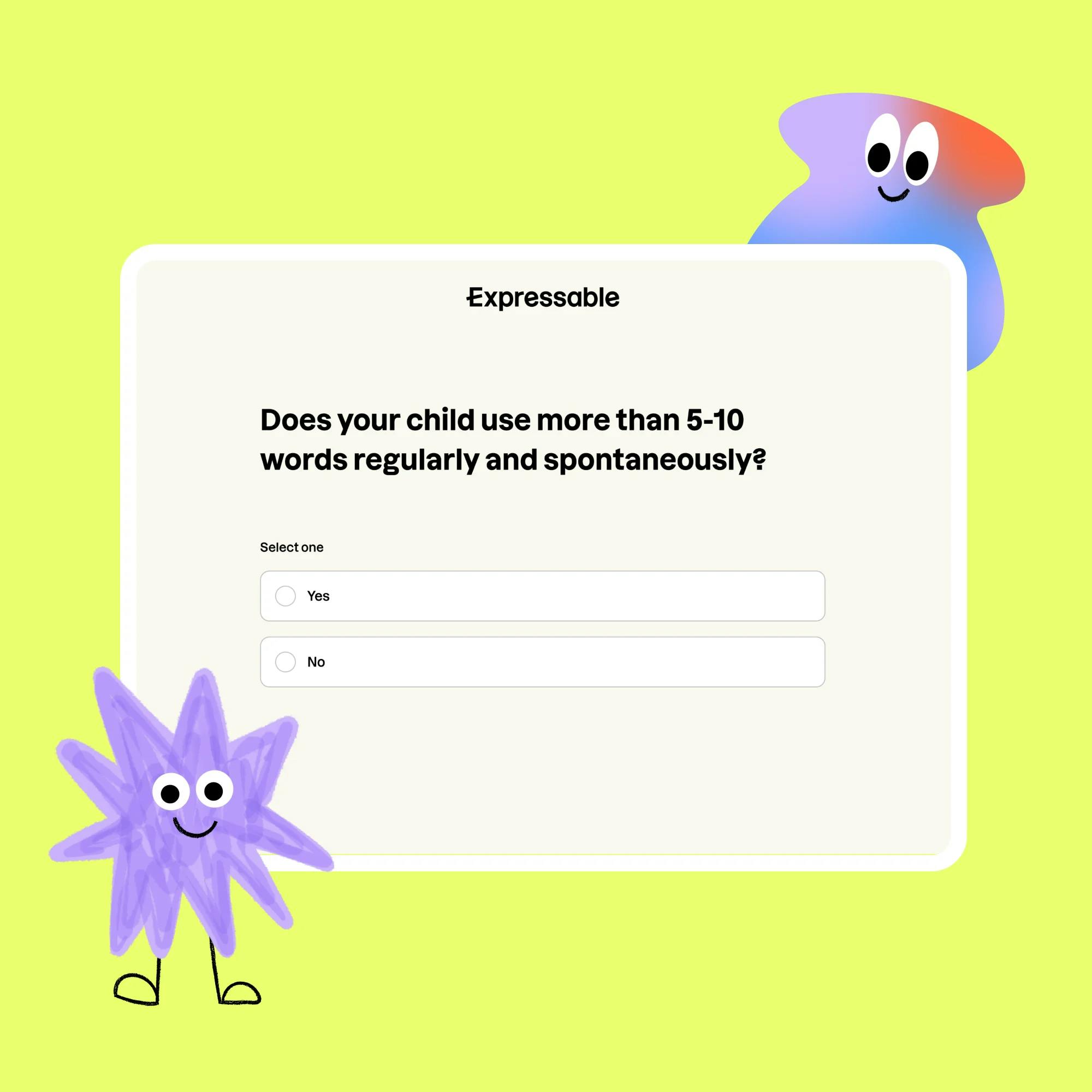If you’re the parent of a child with childhood apraxia of speech (CAS), or you think your child might have apraxia, you probably have questions. Are they just a late talker? Will they need speech therapy? Will my child ever talk?
These are all valid questions. Every child with CAS is unique, with individual strengths and differences. However, a child with apraxia is not likely to outgrow it. Speech therapy is needed to improve their speech and overall communication.
Keep reading to learn how apraxia is different from a speech delay and how speech therapy can help children with apraxia learn to communicate.
What is childhood apraxia of speech?
Childhood apraxia of speech is a motor-planning disorder. In fact, the root of the word, “praxis,” means “planned movement.” A person with apraxia has the language capacity to talk, but the signals between their brain and mouth muscles aren’t sent correctly.
A child with CAS may know exactly what they want to say. However, their brain struggles to tell the muscles in their mouth how to move in order to make the right sounds. As a result, they have difficulty coordinating their mouth to turn sounds into syllables, syllables into words, and words into phrases. People with apraxia are often described as “difficult to understand.”
Children who have apraxia are likely born with the condition. It’s called “childhood apraxia of speech” because it begins in childhood and is not acquired later. Acquired apraxia of speech results from damage to the brain, such as from a stroke or some other kind of head injury.


How is apraxia different from a speech delay?
Apraxia is different from being a “late talker” or having a speech delay. In many cases, when a child is late in developing their language skills, they are still learning vocabulary and how to use words for specific purposes. With apraxia, the child likely knows what words they want to use, but they are physically unable to.
How is apraxia different from a speech sound disorder?
Apraxia may resemble problems pronouncing speech sounds correctly, such as articulation and phonological disorders. Kids with these diagnoses all have trouble speaking clearly. However, the reasons for the speech errors are different.
In an articulation disorder, a child is making an incorrect but consistent error for specific sounds. For example, maybe they pronounce /s/ in a slushy-sounding way.
In phonological disorders, the child is making consistent errors, but they follow a pattern across similar sounds. For example, maybe they are “fronting” sounds that are usually produced in the back of the mouth. So sounds like /k/ and /g/ (made in the back of the mouth) would sound like /t/ or /d/ (made in the front of the mouth). As an example, the word “go” would be pronounced “doe.”
What are the signs of childhood apraxia of speech?
With apraxia, speech errors often vary, instead of being consistent. Take a look at some of the main symptoms of childhood apraxia of speech:
Inconsistent errors in speech: A child with apraxia may pronounce the same word differently each time they say it. For example, one day they may say a difficult word correctly, but soon after they have trouble repeating it.
Distorting sounds: Because people with apraxia do not place their mouth muscles in the right places, sounds often come out incorrectly. Pronouncing vowels can be especially difficult, as can longer and more complex words.
Groping for sounds: People with apraxia can seem like they’re “groping” for words with their mouth. They may try saying a word several times before they say it correctly.
Inappropriate intonation, stress, or rhythm of words: Children may struggle with the rhythm and flow of speech. They may segment syllables in a word, leave out syllables in words and phrases, or pause inappropriately while speaking.


Why speech therapy is needed for apraxia
Speech therapy is always necessary with a diagnosis like apraxia. It is uncommon for a child with apraxia to “catch up” on their own, so there is no benefit to waiting to begin therapy. Kids with apraxia need speech therapy in order to learn how to make the correct motor patterns for speech with their mouth. The earlier they can begin getting this help, the better.
Currently, there are no definitive studies on the long-term outcomes of children with apraxia. But we do know that consistent speech therapy, held one-on-one with a speech-language pathologist and supported by the child’s family, provides the best chance for improvement. A child isn’t likely to “outgrow” apraxia and improve their communication without therapy.


What to expect in speech therapy for apraxia
If your child is diagnosed with apraxia of speech, your speech therapist will create a treatment plan that includes specific, sound-related goals. Therapy will focus on frequent practice and repetition of these speech sounds. Having at least three sessions a week is often recommended in order to make appropriate progress.
Speech therapists use different techniques to help children learn to produce sounds and words more clearly. These may include prompts such as:
Visually showing the child how to produce each sound with their mouth. For example, a speech therapist may say words at the same time as the child.
Tactile cues, such as touching the lips to remind the child to close their lips for the /m/ sound
Having the child listen to speech sounds and determine if they’re correct or incorrect
The speech therapist will monitor and track the child’s progress toward each goal. For the best outcomes, children with apraxia may need speech therapy sessions for several years.
Will a child with apraxia eventually talk?
Just as individual symptoms of apraxia vary, so does progress. The treatment techniques that work for one child may not work for another, and each person progresses at their own pace.
Some children with severe apraxia of speech may need to use other ways to communicate clearly and express their thoughts. These methods can include:
Sign language
Using a notebook with pictures or written words
An alternative or augmentative communication (AAC) device, such as a communication board or a portable tablet that writes and produces speech
These assistive tools may not be needed long-term. However, using these modes of communication while working with a speech therapist can help promote the ability to talk. Being able to communicate their wants and needs can also decrease any frustration your child feels.
If you suspect that your child has apraxia, don’t wait to schedule a speech evaluation. Start the process by speaking with your child’s pediatrician. They may have speech therapists to recommend. Or you can contact a speech therapy practice directly to start getting your questions answered. You can learn more about Expressable's treatment program for childhood apraxia of speech here.
The sooner you start speech therapy, the faster your child can begin making progress. With your child’s speech therapist, you’ll work as a team to help your child be the best communicator they can be!
How Expressable Can Help
Concerned your child isn't reaching age-expected milestones? Looking for communication support from a professional? Expressable is a national online speech therapy practice serving children and adults. We treat all major areas of communication and feeding, offer flexible hours including evenings and weekends, and accept most major health insurance plans. We’re proud to have earned more than 3,000 5-star reviews from our clients (4.9/5 average).
Our therapy model is centered on parent and caregiver involvement. Research proves that empowering caregivers to participate in their loved one’s therapy leads to better outcomes. That’s why we combine live, 1-on-1 speech therapy with personalized education and home practice activities for faster progress.
Communication is more than words. It’s how we share how we feel and show who we are. We’re here to help you or your child do just that.

 Abby Barnes, M.S., CCC-SLP
Abby Barnes, M.S., CCC-SLP








